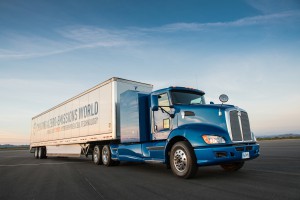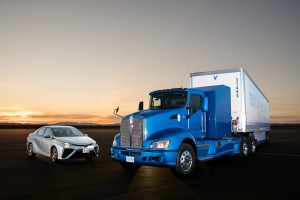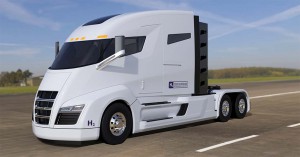
Toyota will begin a study this summer that could see hydrogen-powered trucks go into operation at two key Los Angeles ports.
While Tinseltown’s air quality has improved dramatically over the last few decades, there are still some problem spots, especially near the bustling Ports of Los Angeles and Long Beach where long lines of diesel trucks queue up to drop off or pick up their loads of cargo.
State and local regulators have struggled to clear the air along the 710 freeway that links the ports but, so far, with only limited success. Now, Toyota hopes to offer an even more dramatic solution through what it is calling “Project Portal.”
The maker late last year hinted that it had begun working on a project that would use its fuel-cell technology in a heavy-duty truck. On Wednesday, it revealed that the first possible application could see hydrogen-powered semis replace diesel models at the two Los Angeles-area ports. A proof-of-concept study will begin over the summer.
“Toyota believes that hydrogen fuel cell technology has tremendous potential to become the powertrain of the future,” said TMNA Executive Vice President Bob Carter. “With Project Portal, we’re proud to help explore the societal benefits of a true zero emission heavy-duty truck platform.”
Toyota is currently one of three manufacturers – along with Honda and Hyundai – selling fuel-cell vehicles, or FCVs, in the U.S. market, with several other manufacturers expected to add their own hydrogen vehicles in the not-too-distant future.
(Click Here for a review of the 2017 Honda Clarity FCV.)
The 2017 Toyota Mirai produces 151 horsepower and 247 pound-feet of torque, enough to deliver reasonable acceleration with four passengers onboard. For a heavily laden truck – Project Portal envisions gross combined weight capacity of 80,000 pounds – that would fall far short. The hydrogen truck Toyota is developing will deliver 670 hp and 1,325 lb-ft of torque using two modified Mirai fuel-cell stacks paired with a 12 kilowatt-hour lithium-ion battery.
While the Mirai gets more than 300 miles of range with a tankful of hydrogen, the Toyota truck would get “200 miles per fill, under normal drayage operation,” according to the automaker. Unlike a battery-electric vehicle, however, the Project Portal vehicles would be able to refill in a matter of minutes.
That is, of course, if they operate in areas where there is a ready supply of hydrogen, and that currently means parts of Los Angeles and Orange Counties, as well as Santa Barbara, the San Francisco Bay Area and the state capital of Sacramento. In total, there are 26 stations in California, with as many as 70 expected to be open by the end of 2017. And the state has provided funding to boost that to 100 by decade’s end.
“As they did with the Prius and the Mirai, Toyota is taking a leap into the future of technology. By bringing this heavy duty, zero emission hydrogen fuel cell proof of concept truck to the Port, Toyota has planted a flag that we hope many others will follow,” said Mary D. Nichols, chairman of the California Air Resources Board, or CARB.
(Nikola Motors unveils new hydrogen heavy-duty truck. Click Here for more.)
Toyota isn’t the only manufacturer considering zero-emissions truck options. Salt Lake City-based Nikola Motors last December unveiled its hydrogen-powered Nikola One rig, CEO Trevor Milton declaring it “the most advanced semi-truck ever built.” At 20 mpg, the current prototype gets roughly twice the mileage – on an equivalent basis – as a diesel hauler, and will yield up to 1,200 between refills.
Production is set to begin by 2020, and Nikola says it plans to set up a nationwide hydrogen distribution system that would build the cost of fuel into the price of the truck.
Meanwhile, Tesla CEO Elon Musk recently tweeted that the battery-carmaker will unveil its own electric heavy-duty truck in September, one of a number of new models Tesla plans to launch over the next several years.
(For more on Tesla’s plans, Click Here.)



I think this gonna be more friendly to the environment, so this could be “well done toyota” thing..